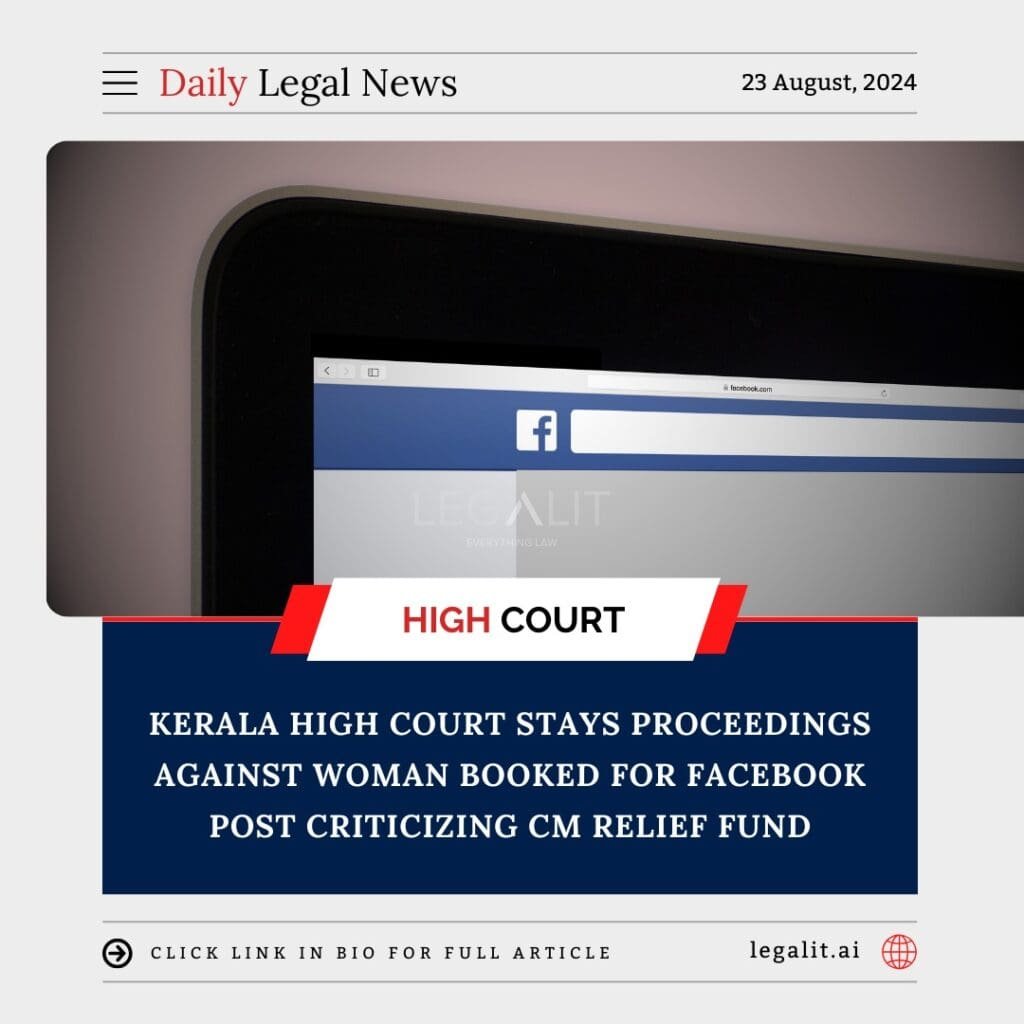
In a significant ruling that touches on the critical balance between freedom of expression and the limits of online discourse, the Kerala High Court has stayed the proceedings against a woman who was booked for a Facebook post criticizing the Chief Minister’s Relief Fund. The decision highlights the judiciary’s role in safeguarding individual rights while navigating the complex dynamics of social media and public opinion.
Background of the Case:
- The Controversial Post: The case revolves around a Facebook post made by a woman in Kerala, in which she allegedly criticized the Chief Minister’s Relief Fund. The fund, which is intended to provide financial assistance during emergencies and disasters, has been a critical resource for the state, particularly in times of natural calamities. The woman’s post, however, was perceived by some as defamatory and led to a police complaint being filed against her.
- Legal Action and Charges: Following the complaint, the woman was booked under various sections of the Indian Penal Code, including those related to defamation and spreading false information. The case quickly drew attention due to its implications for free speech, with many viewing the charges as an overreach by the authorities.
- Public Reaction: The booking of the woman sparked a wider debate on social media and beyond. Supporters of the woman argued that her post was an exercise of her right to free speech and criticized the government for what they perceived as an attempt to suppress dissent. On the other hand, some felt that her post could have undermined public trust in a vital relief mechanism during a critical time.
Kerala High Court’s Ruling:
- Stay on Proceedings: The Kerala High Court intervened in the matter by staying the legal proceedings against the woman. This ruling effectively halts the case for the time being and prevents any further legal action from being taken against her until the court has had the opportunity to fully examine the merits of the case.
- Emphasis on Free Speech: In its ruling, the High Court underscored the importance of free speech in a democratic society. The court noted that while there are limits to freedom of expression, particularly when it comes to defamation and the spread of misinformation, the right to criticize public institutions and figures is a fundamental aspect of democracy. The stay order reflects the court’s cautious approach to cases where legal action may impinge upon an individual’s right to express dissent.
- Need for Balance: The court also highlighted the need for a balanced approach when dealing with cases involving social media posts. It emphasized that while it is essential to protect individuals and institutions from defamatory or harmful content, it is equally important to ensure that the legal system is not used to stifle legitimate criticism or dissenting opinions.
Implications of the Ruling:
- Reaffirmation of Free Speech: The Kerala High Court’s decision is a reaffirmation of the importance of free speech, particularly in the digital age where social media platforms serve as critical outlets for public discourse. By staying the proceedings, the court has sent a clear message that the right to express one’s views, even if critical, is protected under the Constitution.
- Impact on Similar Cases: This ruling could have broader implications for similar cases across India, where individuals face legal action for their social media posts. The stay order may serve as a precedent, encouraging other courts to take a more cautious approach when dealing with cases that involve the potential curtailment of free speech.
- Government Accountability: The case also underscores the need for government accountability in responding to criticism. While it is important to address misinformation and defamatory content, authorities must be careful not to use legal measures as a tool to suppress dissent. This ruling serves as a reminder that the judiciary plays a crucial role in maintaining this balance.
Challenges Ahead:
- Final Resolution: While the High Court has stayed the proceedings, the final resolution of the case remains pending. The court will need to carefully examine the specifics of the woman’s post, the charges brought against her, and the broader context in which the post was made. The outcome of this examination will be crucial in determining the limits of free speech in similar cases.
- Balancing Free Speech and Responsibility: As social media continues to be a powerful tool for communication, the challenge of balancing free speech with the responsibility not to spread harmful or false information remains. Courts, policymakers, and society at large must grapple with how to uphold free expression while ensuring that it does not lead to unwarranted harm or panic.
- Public Perception and Trust: The case also highlights the delicate nature of public perception and trust in government institutions. Authorities must be mindful of how they respond to criticism, as heavy-handed actions can erode public trust and fuel further dissent.
Conclusion:
The Kerala High Court’s decision to stay the case against a woman booked for her Facebook post criticizing the CM Relief Fund is a landmark ruling in the ongoing dialogue around free speech and social media in India. By halting the proceedings, the court has reaffirmed the importance of protecting individual rights to express dissenting views, even as it navigates the complex interplay between free speech and the potential for harm in the digital age. As the case moves forward, it will be closely watched as a potential bellwether for how Indian courts balance these critical issues in the years to come.